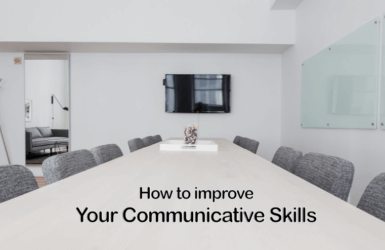Communication is the act of passing and receiving information. But good communication is the act of communicating so that the person at the other end of the chain receives the basic information being passed and is satisfied with the entire communication process.
If the receiver(s) finds it difficult to process the message being passed, they will naturally lose interest. When your audience is no longer interested in what you have to say, the primary purpose of communicating has been forfeited.
“The single biggest problem in communication is the illusion that it has taken place.”
George Bernard Shaw
So you see, good communication is a two-way transaction that goes beyond two people talking to each other; it also involves acquiring new skills, relaying information, asking questions, and making requests with ease.
Improve Your Communication Skills
The Importance of Communication SkillsImproving Your Communication SkillsThe Importance of Communication Skills
Today’s world is a global village, an average individual has hundreds of people in his communication tree (including social media). With a large number of people on our list, we send and process numerous messages daily.
As I stated earlier, good communication is not about the number of messages being exchanged and how well the message is passed and received.
When you communicate efficiently, it improves both personal and professional life.
Personal Life
Good communication makes us better parents, spouses, and friends. When we pay attention when being communicated to, and pass across information in the most concise way possible, we create this special bond with the receiver of the communication. When we communicate effectively with the people around us, we would be exposed to aspects of their life that ordinarily would have gone unnoticed.
Professional Life
Effective communication makes us better colleagues, employees and bosses. You also need to pass your information in the best way possible to your customers. When an instruction is passed, the only way easy it can be executed is if the receiver understands the information being passed.
Bad communication skills on the other hand leaves us exposed to disagreements and frustration.
Improving Your Communication Skills
If you feel that your current level of communication is below standard, here are some ways you can improve your communication skills.
1. Develop Good Listening Habits.
Have you ever had a one-sided conversation with someone? A conversation where you are not given a chance to talk, each time you try to raise an opinion, it is cut short. That is what it feels like to communicate with someone who has bad communication skills.
A good listener should be open to hearing what the other party has to say; communicating should not just be one party passing information. When the other party tries to speak, you should be ready to pay attention and listen.
Paying attention will help you comprehend the entire conversation.
If you want to improve your communication skills, make a conscious effort to listen more, pay close attention to what people around you are saying, and if you need clarification, politely ask for clarification. People appreciate good listeners, so even if you are the initiator of the conversation, give room for contributions.
2. Ensure Clarity and Concision.
“To effectively communicate, we must realize that we are all different in the way we perceive the world and use this understanding as a guide to our communication with others.”
Anthony Robbins
This means the receiver of the message should be at the back of our mind each time we are communicating; it is our responsibility to ensure that our message is passed; this can be achieved through clarity and concision.
When trying to pass a message, your audience is primarily concerned about the message, so you have to say just enough—don’t beat around the bush, don’t talk too much, don’t pass half information. Pass the message as clearly and directly as you can. If you keep saying too many things without hitting the nail on the head, communication has not occurred.
When communicating physically, take a few seconds to think about what you want to say before saying anything.
If you are using email or social media, take a moment to read all over again before you send, this will help make sure the message is being passed across.
3. Be Friendly and Confident.
When communicating, try and ensure that your audience is at ease and comfortable; people are more relaxed when the speaker is using a friendly tune. A less hostile tune puts the receiver in a better position to understand what you are trying to say.
At the same time, be confident; this gives your audience the feeling that they can rely on the message passed.
If you are in a defensive position and you tell the truth without confidence, it can be taken as a lie. People find it difficult to trust a speaker who lacks confidence.
This brings us to the question, ‘how can we communicate in a friendly and confident tune?’ The answer is simple; avoid rude utterances, make eye contact, your tone should be friendly but firm, avoid making question-like statements and finally, be polite.
“To have good communications skills means you are able to make your point without a lot of fillers and stumbling.”
Gregory Davidson
4. Watch Your Body Language.
When you communicate with people, it goes beyond what you say; other factors like eye contact, gesture, voice pitch, and body language contribute to giving meaning to what is being said.
When you pass a message across with a relaxed stance and friendly tone, you’ll be more approachable than if you take a hostile stance, even if what you are saying is the same thing.
Don’t underestimate the role of eye contact in communication; avoiding eye contact with your audience makes it difficult for your audience to take you seriously. When you look at your audience in the eyes, you show that you are focused on the conversation.
Eye contact is tricky because when you fix your eyes on your audience, it can make them feel uncomfortable and self-conscious.
Finally, be conscious of your audience’s body gestures, read the signals from their eye contact and body movement. For instance, if your audience suddenly becomes restless, she probably is uncomfortable with the topic or tired of the conversation altogether.
5. Don’t be Opinionated.
Dogma is the killer of good communication. When you start a conversation believing that you are right, the other party will find it challenging to contribute to the conversation. So avoid being opinionated. Rather be flexible and open-minded.
Entering into a conversation with someone with an entirely different opinion can put you on edge. Still, when you have an open mind, you will control your emotions and pass your message across better.
6. Request and Give Feedback.
What makes communication complete is when there is feedback. When you pass across or receive a message, the only way to verify that the message is understood is to receive or give feedback. This means every time you talk to someone or send a mail, use captions that would trigger feedback like “…. what is your opinion on the subject matter?”.
If you are at the receiving end of the conversation, feedback will go a long way to let the other party know that you understand the message passed.
7. Picking the Right Medium.
How you pass a message gives the receiver of the message an impression. Here is what I mean; It is considered inappropriate to propose to your intending spouse over the phone, similarly. Resignation can be submitted through an email, but layoffs are best done in person. The wrong medium of communication can alter the message being passed across.
Before you communicate, start by asking yourself, ‘what is the best medium of passing the information across?’
The first step for picking the right medium is putting the receiver of the message in mind; for instance, if they are busy, a phone call may be inconvenient, so that an email would be more appropriate. Timing is also an essential factor; you can’t just wake up in the middle of the night and try to call your receiver.
Final Thought
If your communication skill is currently below per, don’t worry if you integrate the steps above, you will certainly find yourself doing better.
“Communication is a skill that you can learn. It’s like riding a bicycle or typing. If you’re willing to work at it, you can rapidly improve the quality of every part of your life.”
Brian Tracy
Good communication skills go beyond your work life; it is pivotal in your relationships as well. No man is an island; that’s why every day we find ourselves engaging in conversations, whether at home, offices, bars, or business places. When we converse, are we just talking for talking sake, or do we have the information we need to pass across? If it is the latter, then we need to make sure we communicate efficiently. When there is poor communication, both parties are left misunderstood and frustrated.
Phone Line Categories











